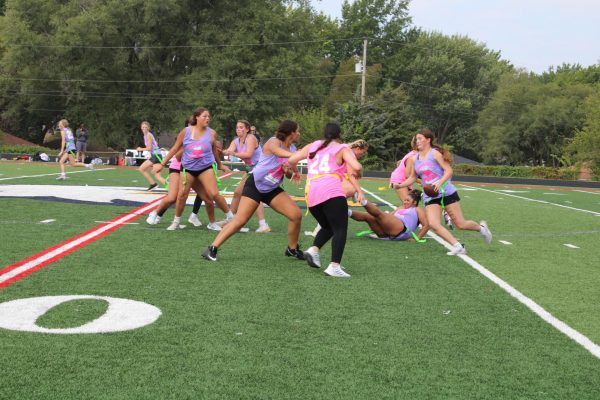Connection Lost
November 4, 2019
“Everyone take out your phones and join this Kahoot,” your teacher announces to the class. “I love Kahoots! These kids are going down,” you proclaim, but when you take out your phone, tragedy strikes. Because of the school’s recent decision to disable WiFi access on personal devices, your phone won’t connect to WiFi; and now your future Kahoot victory has vanished.
Recently, the Olathe School District revoked the ability for personal devices to connect to school internet. This choice has resulted in high scrutiny from the student body, with the big question; who decided to turn off WiFi for cell phones, and why?
The motives behind this decision have been questioned, but according to Olathe Tech Support Andrew Mohr, the answer is quite simple. “It’s an upper management thing, we didn’t have anything to do with the decision,” said Mohr.
Mohr explained that the main problem with the WiFi was that too many devices were connected to the same internet source at one time. When asked why the internet wasn’t turned off last year, Moore did not have a response.
Some Olathe North students have strong opinions on the newfound lack of internet. “It’s bull,” says sophomore Morgan Boyd, “In taking WiFi away, they lowered the bandwidth thinking it wasn’t needed.”
“Now, our phones won’t connect, and our computers were just as bad as before. Nothing was fixed,” Boyd added.
Honors English II teacher Lanie Gray says the removal of WiFi on personal devices doesn’t affect her much, since she uses her school laptop for all technology tasks during school.
“I think this year was a huge improvement in the way we rolled out the laptops; they helped explain the basics of how to maintain and update them and troubleshooting basics students didn’t have last year,” Gray stated.
“The tech support is helpful and necessary for sure. I know teachers and students both use the tech support person,” Gray added.
It is unclear if there is a specific person behind the obliteration of the WiFi, but one thing is for sure: Olathe North is not the only school affected. Every other Olathe high school has disabled the ability for personal devices to be connected.
“It isn’t fair, they need to give us WiFi for our phones,” Olathe East junior Josh Chase said.
Chase continued, “What if our parents need to get in contact with us, or a family member is in the hospital, or our laptop isn’t working and we need to use our phone but we don’t have service?”
Olathe North Technology Support, Spencer Watts, has a different perspective on the disablement of WiFi. Watts revealed that the main reason for dismantling WiFi for personal devices was not to improve WiFi on laptops, but for security and licensing reasons.
“We literally just don’t have enough licenses from our internet service provider to be able to connect all of these devices at once, It’s also for security reasons,” Watts said.
“There’s a thing called FERPA,” he continued, “or the Family Education Rights and Privacy Act, it’s all about just protecting important information, and limiting WiFi access has kind of helped with that.”
FERPA essentially establishes students’ rights to private disclosure of their education record, and affords parents the right to have access to their child’s education records. According to Watts, the disablement of WiFi for personal devices has helped secure the rights promised in FERPA.
The question of who decided to turn of the WiFi, however, is still up in the air, with Watts stating he was unsure of who made the decision, but adding that the Director of Technology may have played a part in the decision.
Genny Hale is the Director of Technology for Olathe Public schools, and when asked about the recent WiFi changes, she had no response on behalf of the Technology Department.
Olathe North principal, Jason Herman has received feedback from students about the lack of WiFi for cell phones.
“Once the district went one to one with laptops; they took the traditional wifi off for students. It’s because of the broad ban that we use for our laptops. If we have all of our devices on the same one, it’s going to slow it down,” Herman explained.
Many students would likely argue that not having WiFi on their cell phones negatively affects their education. “I would ask those students why their cell phone use is a positive thing for their education,” Herman says. “I’m not disagreeing, I believe that our kids need to have the ability to use their cellphones, but how it positively affects their education would be something I would challenge. If a student comes to me and says it’s because they need to look up things on the internet, I gave you a laptop. So, I’m trying to find the positive impact.”
Although Herman questions the positive use of cell phones, according to a survey conducted by independent research firm Survata, 75% of students believe using personal devices in the classroom has improved their ability to learn and retain information.Not to mention, practically every other student at Olathe North carries an iPhone charger, while laptop chargers are hard to come by. This poses the question of whether cell phones are just more practical in students day-to-day life.
Additionally, Herman revealed that he has access to a guest WiFi and that he is in communication with principals from other Olathe high schools to restore internet access to students. “I am trying to get that guest WiFi set up for students to connect to WiFi given that opportunity. I understand being connected to WiFi is the only way people can use their phones, and the minute I know how we can share the guest WiFi, I will share it with the teachers and students.”





